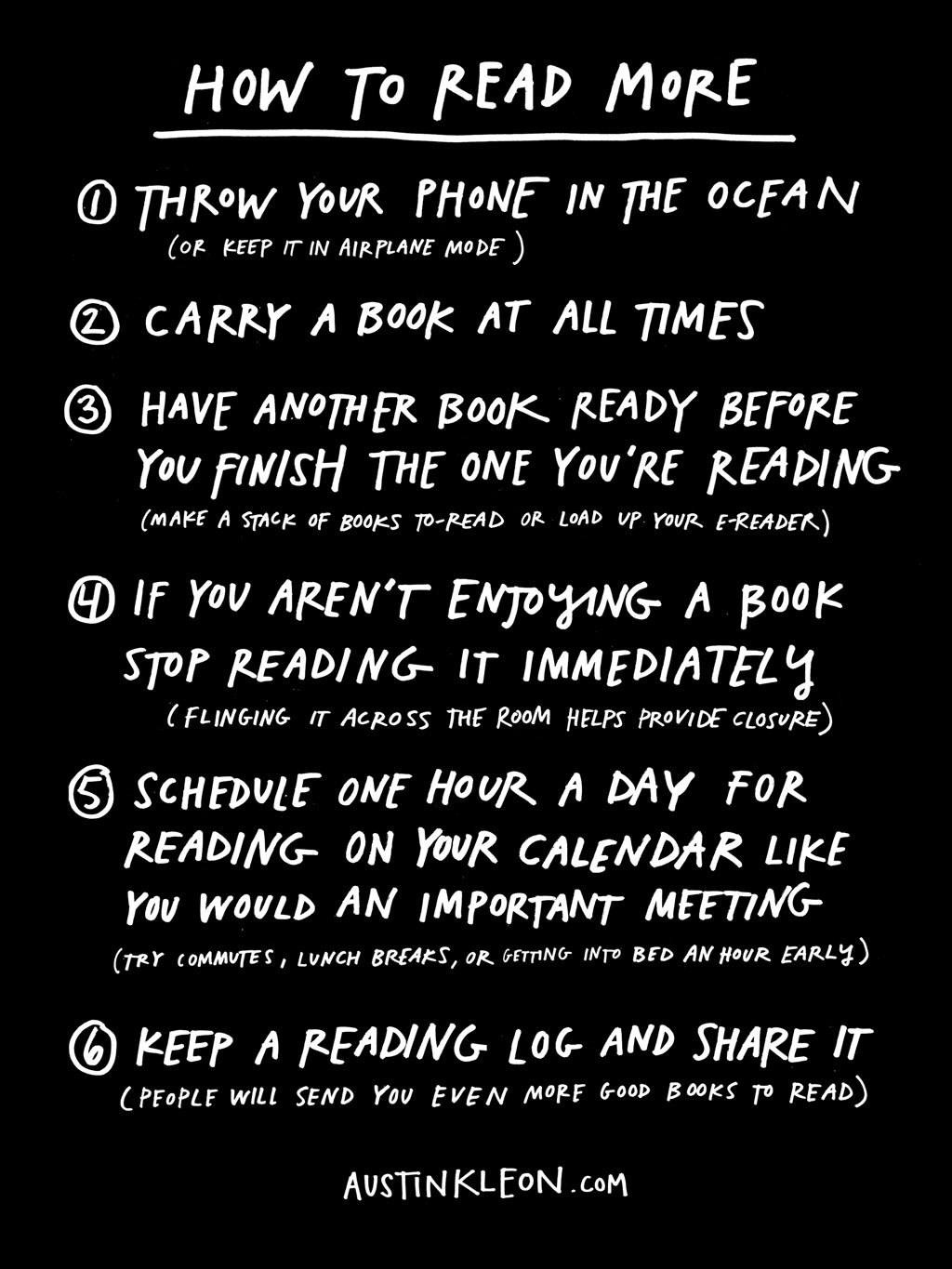Don’t get me wrong. I love reading. I’m that person who asks people about their favourite books, even if I’ve only just met them. My next book is reliably ready on the bedside or my e-reader. And I always have at least one book with me whenever I leave the house; just in case.
These are habits that help me to read more. As someone who is deeply interested in habits (making and breaking) I was pleased to discover that Austin Kleon, the writer, draw-er and prolific reader, had made his own canny list of recommendations for how to read more.
I adored it immediately. Well, all except for Number 4, which has taken me some time to warm to…
“If you aren’t enjoying a book stop reading it immediately (flinging it across the room helps provide closure.)”

When I first read Number 4 it actually made me wince. Surely it’s important to sometimes continue reading those books that one doesn’t enjoy? No mental pain, no mental gain, right?
On deeper reflection, I now wholeheartedly agree. Perhaps it is time for us to let go of any feelings of inadequacy or guilt about unfinished books and simply read what we enjoy. Sure, we can learn to nuance and expand our concept of enjoyment, but at the end of the day, we do know what we enjoy.
Here’s why I recommend this approach…
Curiosity is more important than discipline.
Guilt is not a great reason to do anything. “I should read this” is never as inspiring as “I want to read this”. Happiness, intrigue, confusion and even boredom seem like better reasons to me.
What about reading authors that we don’t agree with, the ones that challenge our worldview? Enjoyment comes in different forms and if I truly value open-mindedness I will appreciate contrarian views, enjoying the provocation to my current thought patterns.
The human mind is endlessly curious. I believe we can get curious about anything when a subject matter feels important to us. In the world of books we may want to deeply understand the mind of someone we wouldn’t normally even talk to, or the history of an event that we previously considered irrelevant. It is this curiosity that must be nurtured if we want to keep reading. And if may just be that the timing is not right.
Books are an intimate experience.
Reading is not dissimilar to a voice in the head. (If it’s an audio-book, all the more so!) It can be an intimate and immersive experience. Just like films, books can produce profound effects on the brain and heart.
Some books trigger insights, love, connection, expansion and lightness. Other books trigger memories, sorrows, detachment, weariness, cynicism or shock. But all these can be a form of enjoyment if I’m engaged with the experience as it unfolds.
Books can also often have unexpected effects, triggering feelings I may not have signed up for. However, once these feelings arise I am often surprisingly appreciative.
The simple awareness of how a book is impacting me can help me decide whether to carry on reading or to switch to a different experience.
Life is short, attention is precious, time is limited — we all know these things. So we must choose for ourselves, carefully, if a book is worth our attention.
Which ideas will we allow to move and mould us? Which words will we allow to climb inside our heads and dance?

There is no point in showing off.
Have you noticed the instinctive pride and comparison involved in reading? Our bookshelves are intellectual fashion statements. We judge ourselves against others, and against an idealised, aspirational version of ourselves that we ourselves have crafted.
At least that’s my explanation for why so many people buy books like “A Brief History of Time” by Stephen Hawkings, and (accordingly to something called the Hawkings Index which tracks how far people read books on their Kindles) the average reader doesn’t get past the first 6.6% of this legendary book.
While intellectual pride can helpfully nudge us, spurring us on to try new things (who knew I would love Marcus Aurelius?), it can also stop us from accepting ourselves for who we are.
We are unique creatures. It would be a monotonous world if we all loved the same books. We don’t, and that’s got to be a good thing.
Enjoyment is a way of harnessing attention.
As much as I love reading, the truth is I often struggle to remain focused in the midst of easily-available distractions and addictions.
When I really want to buckle down, I put my phone in another room, or unplug the Wifi router (yes, I know it sounds a bit extreme but it works!). Sometimes I surprise myself and become completely immersed in what I am reading.
But without the staying power of enjoyment, I’m unlikely to be there very long. The squirming mind will start to remind me of that something important I should probably be doing instead, like the laundry.
I’d rather read a book that I can enjoy than not read at all.
My meditation teacher often says “learn to enjoy whatever it is you are doing.” Through the sustained practice of being immersed in any one task — whether it is reading, laundry or meditation — I’m actually strengthening my attention muscles. So who knows, over time I may develop the ability to focus on and enjoy any book I pick up.
Meanwhile, you’ll find me with my head in that book I’m enjoying!

